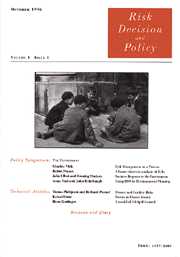Crossref Citations
This article has been cited by the following publications. This list is generated based on data provided by
Crossref.
Huber, Oswald
and
Huber, Odilo W
2003.
Detectability of the negative event: effect on the acceptance of pre- or post-event risk-defusing actions.
Acta Psychologica,
Vol. 113,
Issue. 1,
p.
1.
Schulte-Mecklenbeck, Michael
and
Huber, Oswald
2003.
Information search in the laboratory and on the Web: With or without an experimenter.
Behavior Research Methods, Instruments, & Computers,
Vol. 35,
Issue. 2,
p.
227.
Huber, Oswald
2004.
Entscheiden unter Risiko: Aktive Risiko-Entschärfung.
Psychologische Rundschau,
Vol. 55,
Issue. 3,
p.
127.
Huber, Oswald
and
Wicki, Dominik
2004.
Risk defusing in decision making: prevention or intervention?.
Risk, Decision and Policy,
Vol. 9,
Issue. 4,
p.
359.
Ranyard, Rob
Hinkley, Lisa
Williamson, Janis
and
McHugh, Sandie
2006.
The role of mental accounting in consumer credit decision processes.
Journal of Economic Psychology,
Vol. 27,
Issue. 4,
p.
571.
Shiloh, Shoshana
Gerad, Liora
and
Goldman, Boleslav
2006.
Patients' information needs and decision-making processes: What can be learned from genetic counselees?.
Health Psychology,
Vol. 25,
Issue. 2,
p.
211.
Huber, Odilo W.
2007.
Uncertainty and Risk.
Vol. 41,
Issue. ,
p.
261.
Huber, Oswald
2007.
Uncertainty and Risk.
Vol. 41,
Issue. ,
p.
291.
Maytorena, Eunice
Winch, Graham M.
Freeman, Jim
and
Kiely, Tom
2007.
The Influence of Experience and Information Search Styles on Project Risk Identification Performance.
IEEE Transactions on Engineering Management,
Vol. 54,
Issue. 2,
p.
315.
Huber, Oswald
and
Huber, Odilo W.
2008.
Gambles vs. quasi-realistic scenarios: Expectations to find probability and risk-defusing information.
Acta Psychologica,
Vol. 127,
Issue. 2,
p.
222.
Bär, Arlette S.
and
Huber, Oswald
2008.
Successful or unsuccessful search for risk defusing operators: Effects on decision behaviour.
European Journal of Cognitive Psychology,
Vol. 20,
Issue. 4,
p.
807.
Caratelli, Massimo
2009.
Transparency Between Banks and Their Customers - Information Needs and Public Intervention.
SSRN Electronic Journal,
Huber, Oswald
Bär, Arlette S.
and
Huber, Odilo W.
2009.
Justification pressure in risky decision making: Search for risk defusing operators.
Acta Psychologica,
Vol. 130,
Issue. 1,
p.
17.
Chen, Tao
Kalra, Ajay
and
Sun, Baohong
2009.
Why Do Consumers Buy Extended Service Contracts?.
Journal of Consumer Research,
Vol. 36,
Issue. 4,
p.
611.
Huysentruyt, Marieke
and
Read, Daniel
2010.
How do people value extended warranties? Evidence from two field surveys.
Journal of Risk and Uncertainty,
Vol. 40,
Issue. 3,
p.
197.
Huber, Oswald
Huber, Odilo W.
and
Bär, Arlette S.
2011.
Information search and mental representation in risky decision making: The advantages first principle.
Journal of Behavioral Decision Making,
Vol. 24,
Issue. 3,
p.
223.
Huber, Oswald
2012.
Risky Decisions.
Current Directions in Psychological Science,
Vol. 21,
Issue. 1,
p.
26.
Jindal, Pranav
2012.
Risk Preferences and Demand Drivers of Extended Warranties.
SSRN Electronic Journal,
Ranyard, Rob
and
McHugh, Sandie
2012.
Defusing the risk of borrowing: The psychology of payment protection insurance decisions.
Journal of Economic Psychology,
Vol. 33,
Issue. 4,
p.
738.
Ranyard, Rob
and
McHugh, Sandie
2012.
Bounded rationality in credit consumers’ payment protection insurance decisions: the effect of relative cost and level of cover.
Journal of Risk Research,
Vol. 15,
Issue. 8,
p.
937.

